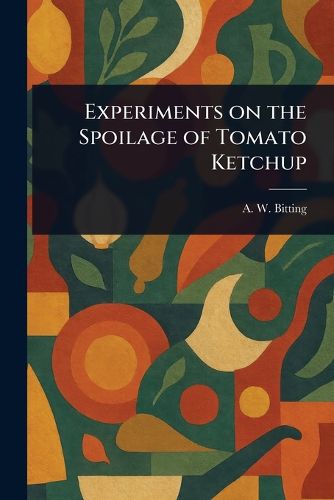Readings Newsletter
Become a Readings Member to make your shopping experience even easier.
Sign in or sign up for free!
You’re not far away from qualifying for FREE standard shipping within Australia
You’ve qualified for FREE standard shipping within Australia
The cart is loading…






This title is printed to order. This book may have been self-published. If so, we cannot guarantee the quality of the content. In the main most books will have gone through the editing process however some may not. We therefore suggest that you be aware of this before ordering this book. If in doubt check either the author or publisher’s details as we are unable to accept any returns unless they are faulty. Please contact us if you have any questions.
"Experiments on the Spoilage of Tomato Ketchup" by A. W. Bitting delves into the fascinating science of food preservation, specifically focusing on ketchup. This detailed study explores the causes of food spoilage in this popular condiment, offering insights into food chemistry and the principles of food science. Discover a range of experiments examining factors influencing ketchup's longevity, from ingredient ratios to storage conditions. A valuable resource for those interested in the historical context of food technology and agriculture, this book sheds light on early efforts to understand and combat food spoilage. Whether you are a food enthusiast, a student of food science, or simply curious about the history of ketchup, this book provides a unique and informative look at this ubiquitous sauce.
This work has been selected by scholars as being culturally important, and is part of the knowledge base of civilization as we know it.
This work is in the public domain in the United States of America, and possibly other nations. Within the United States, you may freely copy and distribute this work, as no entity (individual or corporate) has a copyright on the body of the work.
Scholars believe, and we concur, that this work is important enough to be preserved, reproduced, and made generally available to the public. We appreciate your support of the preservation process, and thank you for being an important part of keeping this knowledge alive and relevant.
$9.00 standard shipping within Australia
FREE standard shipping within Australia for orders over $100.00
Express & International shipping calculated at checkout
This title is printed to order. This book may have been self-published. If so, we cannot guarantee the quality of the content. In the main most books will have gone through the editing process however some may not. We therefore suggest that you be aware of this before ordering this book. If in doubt check either the author or publisher’s details as we are unable to accept any returns unless they are faulty. Please contact us if you have any questions.
"Experiments on the Spoilage of Tomato Ketchup" by A. W. Bitting delves into the fascinating science of food preservation, specifically focusing on ketchup. This detailed study explores the causes of food spoilage in this popular condiment, offering insights into food chemistry and the principles of food science. Discover a range of experiments examining factors influencing ketchup's longevity, from ingredient ratios to storage conditions. A valuable resource for those interested in the historical context of food technology and agriculture, this book sheds light on early efforts to understand and combat food spoilage. Whether you are a food enthusiast, a student of food science, or simply curious about the history of ketchup, this book provides a unique and informative look at this ubiquitous sauce.
This work has been selected by scholars as being culturally important, and is part of the knowledge base of civilization as we know it.
This work is in the public domain in the United States of America, and possibly other nations. Within the United States, you may freely copy and distribute this work, as no entity (individual or corporate) has a copyright on the body of the work.
Scholars believe, and we concur, that this work is important enough to be preserved, reproduced, and made generally available to the public. We appreciate your support of the preservation process, and thank you for being an important part of keeping this knowledge alive and relevant.